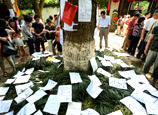
EL FASHER, Sudan, May 26 (Xinhua) -- The United Nations-African Union Mission in Darfur (UNAMID) is concerned about realizing stability and peace in the region, at a time when viewpoints varied over the mission's ability to achieve its goal in maintaining peace and implementing its mandate in the region.
However, most of Darfur areas have witnessed a remarkable improvement in the security situation, the UNAMID is still concerned that the relative security improvement could collapse at any moment due to complexity of the conflict in the region.
The mission steers daily patrols, from its headquarters in El Fasher, capital of North Darfur State, to get acquainted with the security situation and stability in the province.
The patrol, which usually comprises of 10 to 15 vehicles with peacekeepers aboard, abides by strict orders regarding movement and routes and coordinates with the local authorities concerning its routine movement.
On Sunday, the mission steered a patrol, accompanied by a team from Xinhua, to Abu Shouk camp for internally displaced persons ( IDPs), some 3 km north of El Fasher town.
The patrol embarked its tasks in the camp by receiving a report from Haqar Adam Terab, a Sudanese police officer on duty at the camp, concerning the security situation and the humanitarian conditions at the camp.
Terab briefed the patrol commander that the security situation was completely stable.
"During the past 24 hours we have not received any reports on any crime. The situations are perfect and we hope it would continue so," the officer said.
He further responded to questions by the patrol members on the ways adopted by the police authorities to manage the internal conflicts at the camp along with the police's role in resolving the issues.
As the UNAMID patrol moved through the camp, children waved to the international peacekeepers, which indicated the growing friendliness, though cautious, between UNAMID and people of the Darfur community.
The patrol arrived at Khaimat Al-Omad, a meeting tent for the Omdahs (chieftains) and Sheikhs (the local leaders of the people in the camp) who are entrusted with running the camp affairs in coordination with the government authorities.
The situations at the camp were better than before, stressed a number of Omdahs and Shiekhs, who enjoy great respect within the camp community.
"Our conditions are good compared to the past, but our demands are still confined to the importance of provision of health, education, food, water and security," Omdah Adam Ali Mohamed, deputy chief of Omdahs at Abu Shouk camp, told Xinhua.
"There is a great improvement in the security situation at Abu Shouk camp, thanks to the efforts of the government, UNAMID and the Shiekhs and Omdahs," he added.
For his part, Adam Musa Adam, one of the Omdahs at Abu Shouk camp, said that the majority of the IDPs were willing to voluntarily return to their home areas.
"Around 80 percent of the people in the camp are willing to return to their villages. We have not used to live here. The homes are very small and the living conditions are hard. We want to return but provision of security is still our concern," he told Xinhua.
He further said that UNAMID provided important services in many fields including developmental services, in addition to assisting the local communities to overcome the effects of war.
He, however, downplayed the mission's role in achieving security and stability, saying "this mission is for peacekeeping, while there is no peace on the ground."
There are around 163,000 IDPs in North Darfur State, distributed at five IDP camps, including Abu Shouk, the biggest, where around 50,000 IDPs live, besides Al-Salam camp with 49,000 IDPs, Zamzam with 39,000, Kassab with 26,000 and Fata Barno with 24,000.
















 Couple say 'I do' after 35-year wait
Couple say 'I do' after 35-year wait


![]()
